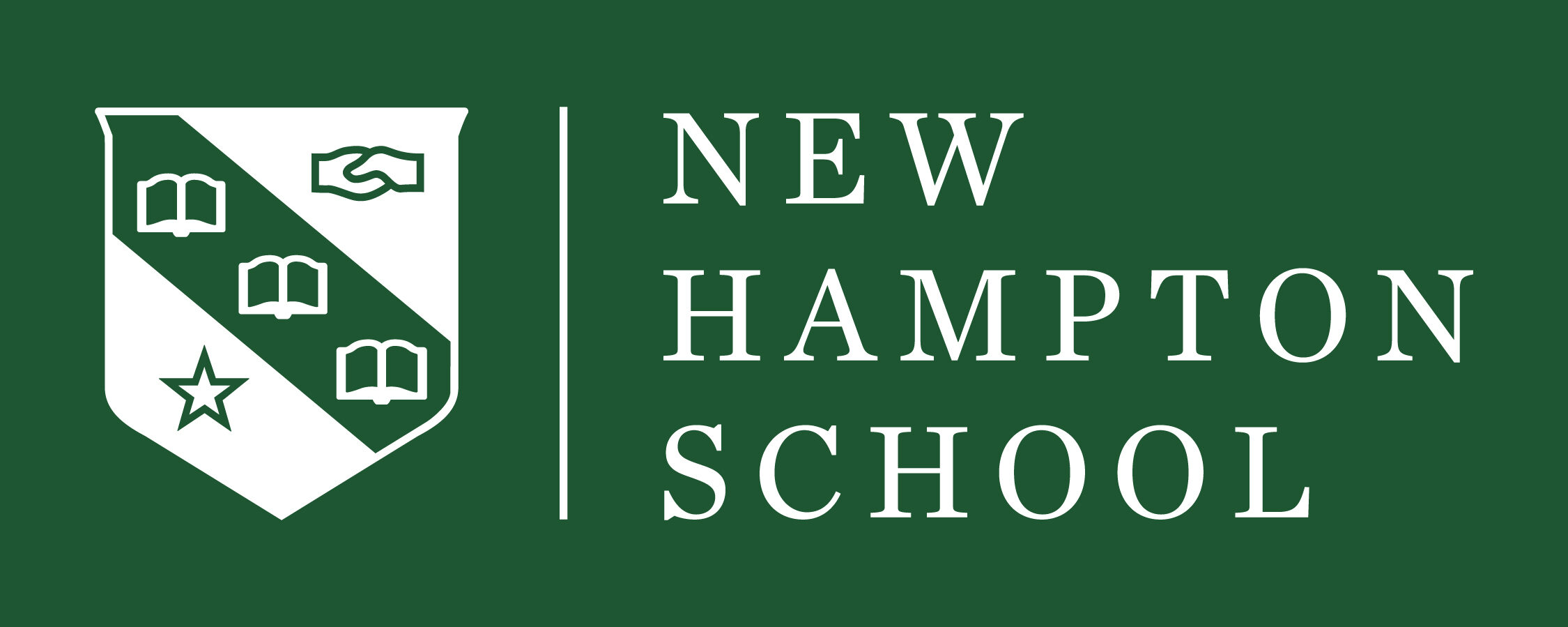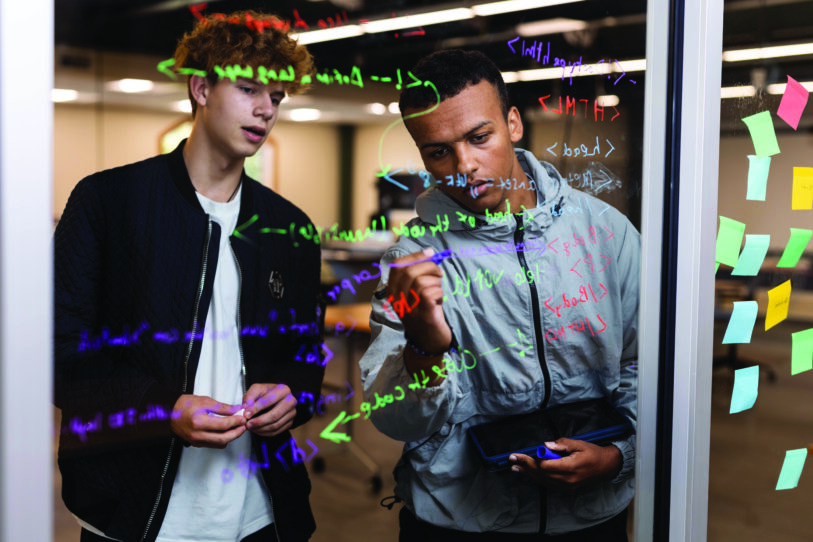The following article originally appeared in the Fall 2022 edition of Hamptonia. View the full magazine online.
New Hampton School has laid the educational foundation for countless alumni entrepreneurs over the years. The students themselves provide the main driving force in creating a defined Entrepreneurial Studies Program within our curricula. They are inspired by possibility and seek opportunity. But it is essential to note the support and inspiration from the greater community, including many former and current parents, grandparents, and friends of the School. Our community is, in fact, full of successful entrepreneurs who have built businesses within the industries of hospitality, staffing and recruiting, real estate, finance, and technology—the list goes on and on.
New Hampton School’s mission to cultivate lifelong learners who serve as active global citizens is, in part, defined as engaging in real-world issues to expand knowledge and understanding and using analytical thinking and social skills to work creatively and communicate effectively. The Entrepreneurial Studies Program strives to develop an entrepreneurial spirit and flexible mindset amongst students that will foster collaboration, leadership, and creative problem-solving skills. These two missions intersect in offering learners similar skills while also expanding on their individual ideas and interests.
In support of the 2021 Strategic Plan, our vision is to empower students to solve the world’s toughest challenges by keeping innovation, experience, character, tradition, and strength at the forefront of our teaching. With increased interest and support for education focused on developing skills needed in an evolving workplace, New Hampton School has established an Entrepreneurial Studies program to serve the needs of our students.
Though all the elements of our vision are essential, innovation and experience speak most boldly to the idea of entrepreneurship through encouraging hands-on and out-of-classroom academic experiences, creative problem-solving, and thinking beneath the surface. Three core courses of study provide solid viewpoints for young learners to engage with the ideas behind creating a business—Entrepreneurship: Start-Ups, Financial Modeling, and Human-Centered Design. Drafting these courses provided endless discussions and opportunities for research and collaboration. A list of goals soon emerged. These courses would highlight the best of project-based learning and challenge students to stand up for their ideas, shift their perspectives, collaborate, and to create, adjust, and defend choices. Their new classroom experience would become a sandbox—a creative lab bound only by their minds.
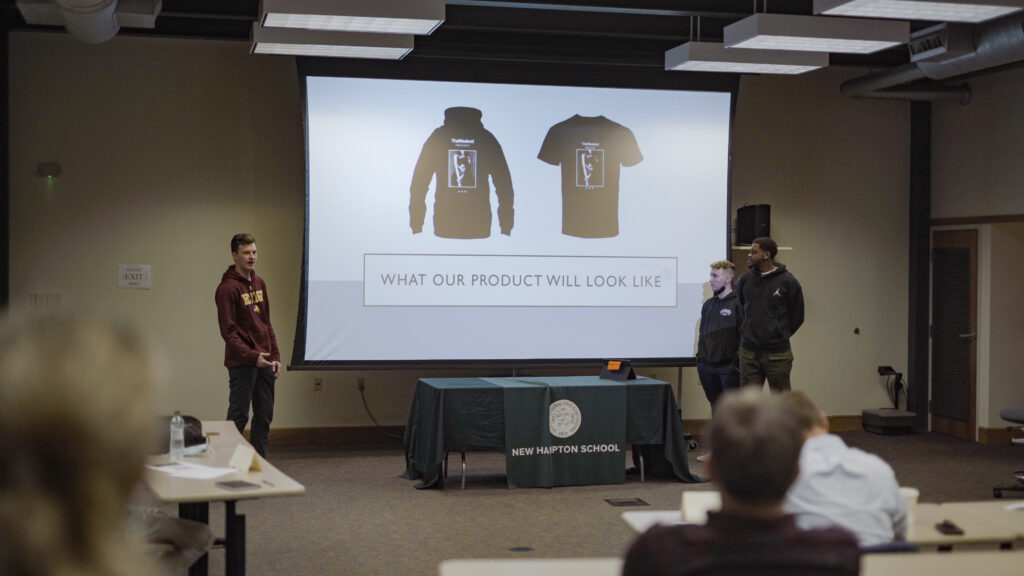
Huskies Enter the Shark Tank
During our annual Fall Family Weekend, a session mirroring the popular television show Shark Tank was hosted for the Entrepreneurship: Start-Ups class. This exercise in pitching ideas brought eager students, armed with their business ideas, together with a panel of formidable business-savvy alumni and parents—all successful entrepreneurs themselves. One by one, the thoughtful creators introduced their business ideas, taking time to explain the problem their start-up solves, and sharing their business plan through an initial budget to establish the business. From there, the panel had the opportunity to ask follow-up questions and offer advice based on their experiences as entrepreneurs.
John Fauster P’22, ’24, one of the panelists for the Shark Tank-inspired session and owner of American Aqua, referenced a conversation he had with his son, Jack—then enrolled in Financial Modeling. Jack explained a few content highlights from Financial Modeling and connected its applications to his start-up business in another class. For John, realizing the fullness of his son’s academic experience through how he was using this information and applying it to a real-world situation struck him in a new way. He remarked about how advanced this work and these conversations seemed for his son’s current stage—high school. Knowing Jack’s expressed interest in becoming an entrepreneur, John felt encouraged by the skills his son was already gleaning from his studies in entrepreneurship. These are courses that invest time in building valuable skills now for a multitude of careers.
The program’s curricula provide unique opportunities for students who already feel passionate about following an entrepreneurship path in the future. Students today may feel the call to action for many reasons, whether inspired by a family member, a friend, a charitable cause, an environmental solution, or simply an inspired idea. Uninitiated and curious students enrolling in one of these classes will soon find new ideas to pursue as they consider the highly beneficial entrepreneurial mindset. Awareness and exposure to these foundations are the first steps of their journey.
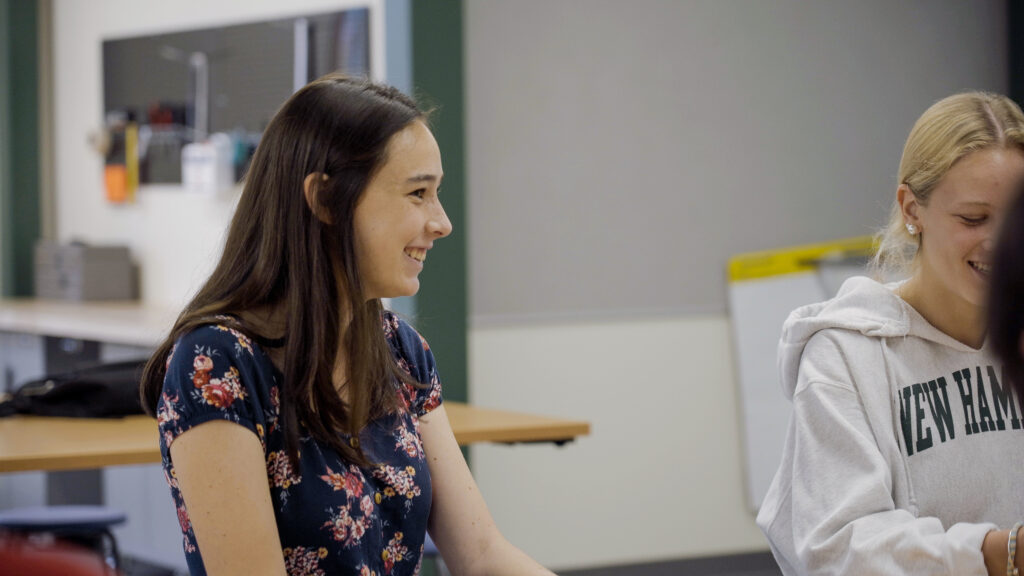
Transforming Sustainable Fashion
Ava Millerick ’24, West Bridgewater, Massachusetts
During Ava’s sophomore year at New Hampton, she enrolled in Entrepreneurship: Start-Ups, where their first goal is to generate ideas for problem-solving business models. Then, they are responsible for selecting their solution and running their start-up for the length of the term. Ava’s start-up is Sustineri (@sustineri.nhs), a trading and thrifting platform. The idea of Sustineri sparked from a desire to obtain clothes more sustainably and affordably. In fact, it originated from a conversation the prior spring during prom season. Prom dresses and formal wear have limited lives past the one celebratory evening of wear. In addition to the potentially prohibitive costs, extending the life of their wear through trades and resale could help ensure that we, as consumers, see the value and service in sustainability. Ava viewed this challenge as a way to make a difference and be part of positive change in her school and her community. “It’s important to start taking care of our world because, at some point, it’s going to be too late.” Sustineri gives people a sustainable and affordable choice for clothing and more.
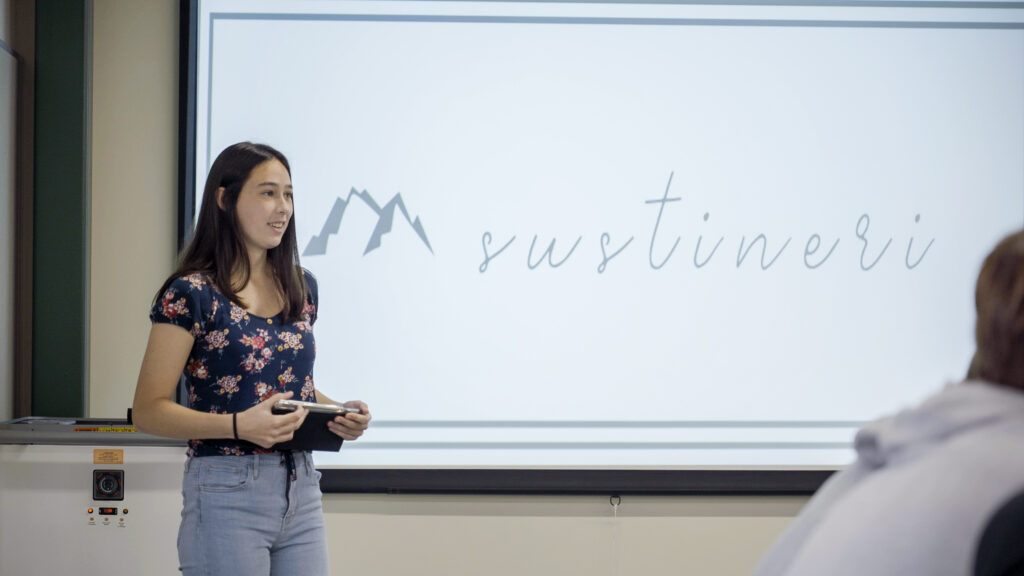
What is Sustineri?
Sustineri provides a sustainable option for people to post clothes that they don’t want anymore and trade for, or possibly buy, other people’s clothes. The idea is that it gives people a sustainable choice to get clothes as it can be confusing to know where to buy clothes from and what places are not environmentally friendly.
What attracts you to entrepreneurial studies?
I saw the opportunity and liked the idea of not being in a class with so much structure; I liked having the freedom to pursue what I wanted. I grew up in the same town for 14 years and felt like I was only learning what was in this town. I like the idea of being able to pursue whatever I wanted to learn and, if I have an idea, trying to make that happen.
What is needed to support young entrepreneurs further?
I think one of the most important things needed to continue entrepreneurship is to integrate into students when they’re younger. Before I came here, it was math class, English class, reading class, Spanish class—and that was it. There was no freedom to pursue what you were passionate about, and I think that’s important for students because I didn’t know what I was passionate about until I came here. I think it’s really important to have that option for students, and I think if you want to be an entrepreneur, you have to pick something that you are passionate about and that you care about, or I don’t think you can be successful.
I have always cared about education a lot, I want to learn more, and now I’m finding more and more things to be curious about outside of the classroom.
The Strength of an Engaged Network
Although the teaching around entrepreneurship begins in the classroom, much of the learning and experience comes from real-life applications. New Hampton School students benefit from an extensive alumni network who are eager to help mentor and guide the way for new entrepreneurs in their fields of interest. This program allows for additional opportunities for students to connect with alumni, parents, and other industry professionals to learn knowledge and skills that will be essential to their success, whether or not they choose to pursue entrepreneurship in the future. In turn, it’s also creating opportunities for our greater community to engage or re-engage, partner, and support the school. Whether through guest lectures or on-site experiences, it strengthens the bridge between what our current students are learning in the classroom and what real-life experiences our extensive external connections can share.

An Internship in Real Estate
Through the Entrepreneurial Studies Program, a recent graduate from Branson, Missouri, Jonathan Ficarra ’22, had the opportunity to complete an internship with Boston-based Century 21 realtor Collin Bray ’02. Since graduation, Collin has been an engaged alumnus and a strong advocate for the school, most recently joining the Board of Trustees in 2021. With 17 years of experience in real estate, Collin jumped at the chance to create a valuable opportunity for a student.
For Jonathan, the interest in real estate came from closely witnessing someone in the field over several years. “One of my friend’s dads [is in] real estate, and he was a huge inspiration. I watched him do it, and I watched him grow and thought—I could do that. I can definitely be like that. And grow. And start my own business—which is really what I want to do, to run my own company.” Real estate represented not only the chance to build a business but to build a life and execute a brand infused with personal vision. It requires creativity, thought, planning, growth, and leadership. “I want the freedom to have my mind be in control of what I get to put out. Instead of taking directions from someone else, I would like to be the one to have my visions out there.”
During this internship, what was one of the most important things you learned about being an entrepreneur?
Follow your gut and do what feels good to you. There’s a lot of originality that comes from being an entrepreneur. You definitely build everything from you. Sure, you can take in ideas from everybody else, but in the end, you’re doing your own thing, and you have to follow what you think will work, and eventually, it will work.
How did learning about real estate in a real-world setting differ from learning about it in the classroom?
There’s definitely a big difference in learning either in the classroom or in the real world, which is very hands-on, which is what I loved about it. You weren’t taking examples out of a textbook to fill out a problem; you were given a real problem you had to solve. After you solved it, you got to see the result, which was super cool. And, normally, you don’t get to see that. You may see a letter grade, but there’s nothing like giving the keys to somebody to their new house.
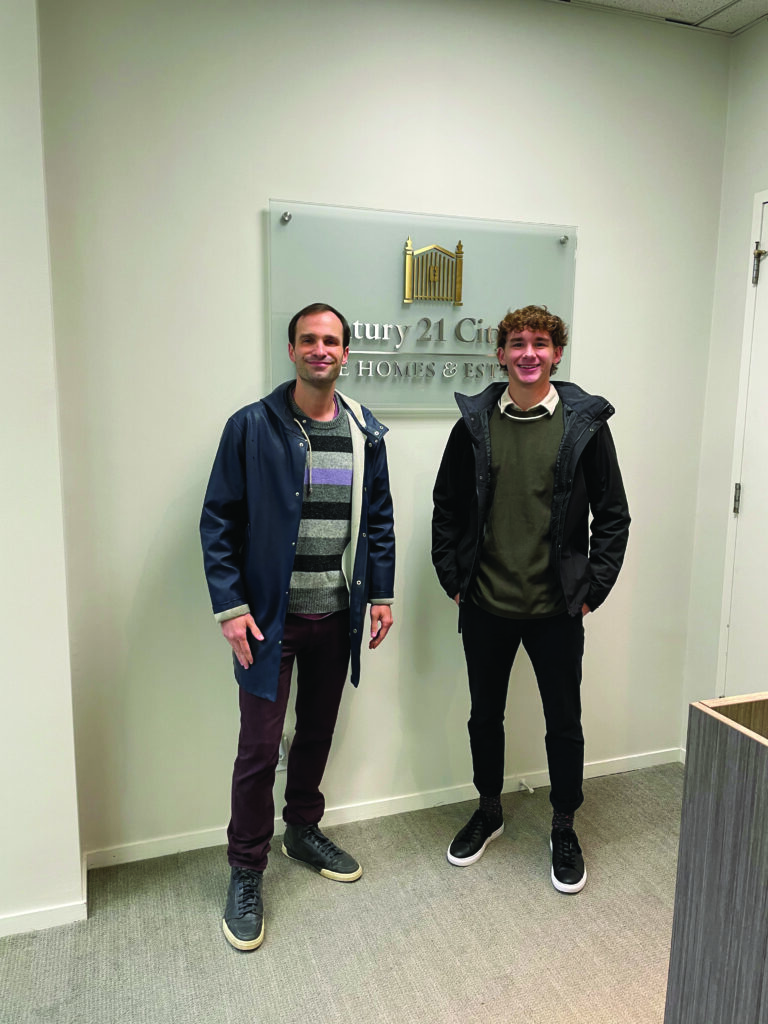
A Network of Possibilities
“I think this is a great program because, as an entrepreneur, you have to think outside the box. Most people are afraid. They are afraid to make decisions. Remember, if you don’t make a decision, ultimately, the decision will be made for you. And most of the time, it won’t be what you wanted. So, Jump!”
– Bill Goldberg ’73
New Hampton School’s community is rich in connections and understands the value of utilizing the whole community. While on campus, our daily community is comprised of faculty, staff, and students, and this number only represents a few hundred of the connections possible. Outside our core campus community is a global network of thousands of voices from alumni, parents, grandparents, trustees, former faculty and coaches, who offer connections and experiences for engagement. We often benefit from their volunteered time at school events and always consider new ways to engage them on campus. The Entrepreneurial Studies Program opened yet another door for this type of opportunity.
Between class discussions on start-ups and finances, it is beneficial to pause and hear from an industry expert. They can provide inspiration, advice, and challenging questions to consider. It is an excellent experience for our students to learn from the people doing the work. Likewise, it is also valuable to welcome our visitors to the classroom, like Bill Goldberg ’73 and others, to witness the continuous progress in curricula, and to interact directly—in short, to be a part of the mission.
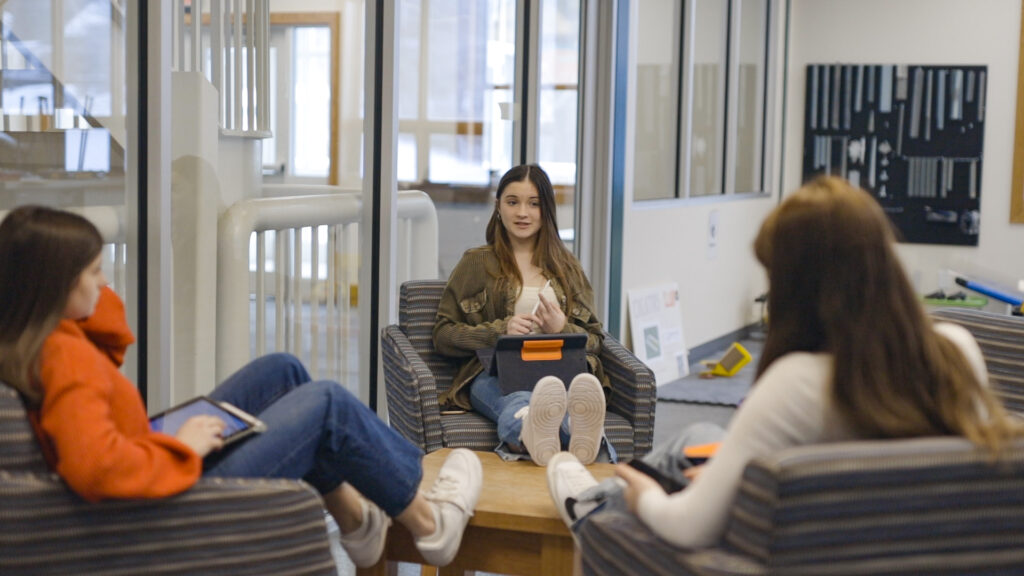
Flexible Thinkers Who Find Solutions
The benefits and outcomes of the Entrepreneurial Studies Program have only just begun at New Hampton School. More than a genre of study, it is a mindset that develops collaboration, leadership, and creative problem-solving. It offers applicable life skills and practical experience beyond the horizon of one chosen career. Regardless of whether a student elects to pursue entrepreneurship long-term, they will know what it is to be a flexible thinker and how to build something from all angles, and to work to find a solution. Students will be armed with effective tools to work through challenges—professionally and personally.
By fostering collaboration, students learn how to work in a team atmosphere as leaders who listen. And, more so, they earn the knowledge that leadership takes many forms. Expertise is not the only factor. A successful leader is a contributor, a community builder, a believer, and an impact person. And each leader, whether an executive or an associate, is essential to community culture and the greater success of a venture.
The trials of today’s world and the anticipated challenges of tomorrow’s world highlight the need for active global citizens, flexible thinkers, and emerging leaders. Our students require education in practical problem-solving experience while building their strengths and passion for creativity and community. So while we want our students to lead confidently, make sound decisions, and know the importance of listening, what’s even more critical—and why this program was created—is that our students want to be changemakers. It is an exploration of a mindset and a pathway full of possibilities.
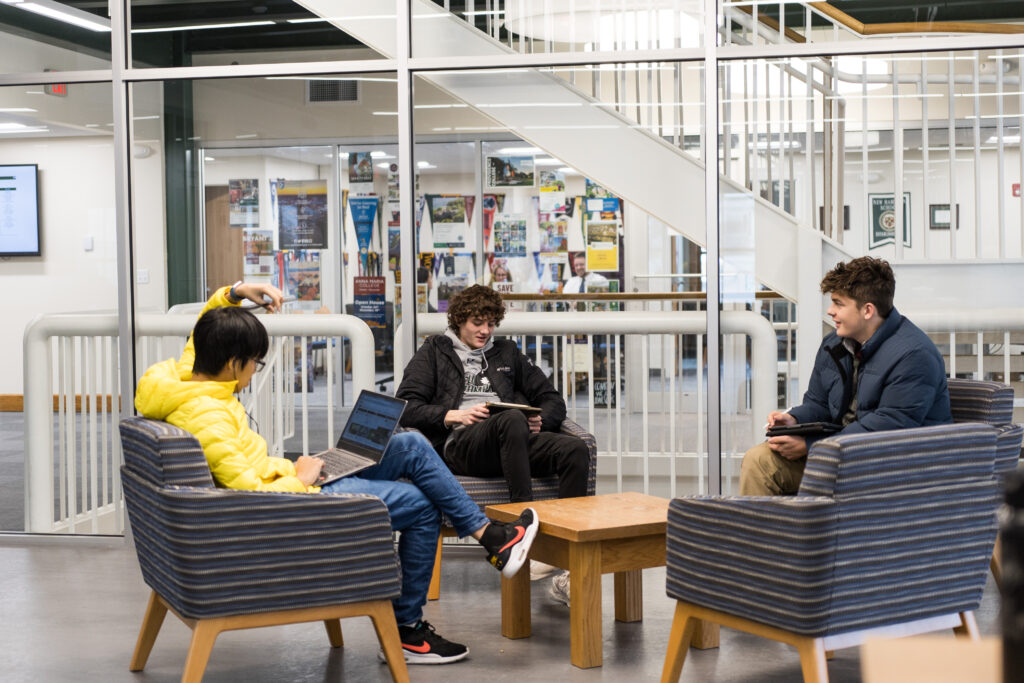
Learn more about our entrepreneurship courses below:
ENTREPRENEURSHIP: START-UPS
This course helps students achieve the program goal of “develop[ing] an entrepreneurial spirit that will foster collaboration, leadership, and creative problem-solving skills.” In this introductory course to the skillsets and mindsets popular among entrepreneurs, students will launch their own start-ups as part of the course. This is project-based learning at its best, providing flexibility and igniting creativity. Students are empowered through voice and choice for their concepts as the course’s competencies guide them. Students learn by doing. To be an entrepreneur, they become entrepreneurs.
FINANCIAL MODELING
This course teaches students the knowledge and skills necessary to evaluate economies, goods and services, and create business organizations that serve their local community. Students analyze sales and operational efficiencies and how they affect a company’s bottom line through financial management. Examining leadership styles and organizational structures allows students to learn from examples of successful founders, thought leaders, and companies. The Financial Modeling course enables students to apply their academic skills and knowledge to think critically in a real-world environment through projects, case studies, interactions with current business professionals, and problem-solving in the business, marketing, entrepreneurial, and financial fields.
HUMAN-CENTERED DESIGN
Students engage in the Fixperts learning program, which challenges people to use their imagination and skills to create ingenious solutions to everyday problems for real people. Rooted in a creative, human-centered design process, it integrates design, engineering, technology, and practical skills for social benefit.
